- Clone
- HMD4-1 (See other available formats)
- Regulatory Status
- RUO
- Other Names
- DLL 4
- Isotype
- Armenian Hamster IgG
- Ave. Rating
- Submit a Review
- Product Citations
- publications
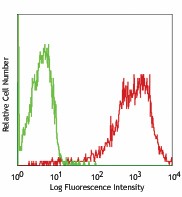
-

Mouse Dll4 transfected cells stained with HMD4-1 APC
| Cat # | Size | Price | Quantity Check Availability | Save | ||
|---|---|---|---|---|---|---|
| 130813 | 25 µg | 161 CHF | ||||
| 130814 | 100 µg | 362 CHF | ||||
The Notch receptors and their ligands are highly conserved from invertebrates to mammals. Delta-like 4 (DLL4) is one of four or five Notch ligands identified. The binding to Notch receptor results in the proteolysis of Notch and movement of intracellular portions of Notch into the nucleus. This translocation triggers a series of signaling processes. DLL4 is reported to be essential for the regulation of angiogenesis. In thymus, DLL4 is an essential Notch1 ligand responsible for T cell lineage commitment.
Product DetailsProduct Details
- Verified Reactivity
- Mouse
- Antibody Type
- Monoclonal
- Host Species
- Armenian Hamster
- Immunogen
- CHO cells expressing murine DLL4
- Formulation
- Phosphate-buffered solution, pH 7.2, containing 0.09% sodium azide.
- Preparation
- The antibody was purified by affinity chromatography, and conjugated with APC under optimal conditions.
- Concentration
- 0.2 mg/ml
- Storage & Handling
- The antibody solution should be stored undiluted between 2°C and 8°C.
- Application
-
FC - Quality tested
- Recommended Usage
-
Each lot of this antibody is quality control tested by immunofluorescent staining with flow cytometric analysis. For flow cytometric staining, the suggested use of this reagent is ≤0.25 µg per million cells in 100 µl volume. It is recommended that the reagent be titrated for optimal performance for each application.
- Excitation Laser
-
Red Laser (633 nm)
-
Application References
(PubMed link indicates BioLegend citation) -
- Wei Y, et al. 2013. PNAS. 110:3910. PubMed (Block)
- Product Citations
-
- RRID
-
AB_2246026 (BioLegend Cat. No. 130813)
AB_2246026 (BioLegend Cat. No. 130814)
Antigen Details
- Structure
- A single-pass transmembrane (TM) protein consisting of a large extracellular N-terminal which includes the DSL domain, followed by a tandem array of EGF-like repeats (ELRs). After the single TM domain is a novel intracellular domain.
- Distribution
-
DLL4 is primarily expressed in arterial blood vessels and sprouting endothelial cells. DLL4 is also expressed in thymic epithelial cells.
- Function
- The Notch receptors and their ligands are highly conserved signaling molecules throughout development. They regulate cell fate of various cell's development, including myogenesis, neurogenesis, and lymphocyte development.
- Ligand/Receptor
- Notch Receptors
- Cell Type
- Endothelial cells, Epithelial cells
- Biology Area
- Immunology
- Antigen References
-
1. Ehebauer MT, et al. 2006. Biochem J. 392:13.
2. Shimizu K, et al. 2000. Mol Cell Biol. 20:6913.
3. Hellstrom M, et al. 2007. Nature 445:776.
4. Suchting S, et al. 2007. P. Natl. Acad. Sci. USA 104:3225. - Gene ID
- 54485 View all products for this Gene ID
- Specificity (DOES NOT SHOW ON TDS):
- Delta-like 4
- Specificity Alt (DOES NOT SHOW ON TDS):
- Delta-like 4
- App Abbreviation (DOES NOT SHOW ON TDS):
- FC
- UniProt
- View information about Delta-like 4 on UniProt.org
Related Pages & Pathways
Pages
Other Formats
View All Delta-like 4 Reagents Request Custom Conjugation| Description | Clone | Applications |
|---|---|---|
| Purified anti-mouse DLL4 | HMD4-1 | FC,Block |
| APC anti-mouse DLL4 | HMD4-1 | FC |
| PE anti-mouse DLL4 | HMD4-1 | FC |
Customers Also Purchased
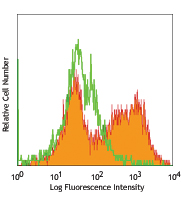
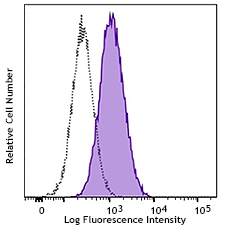
Compare Data Across All Formats
This data display is provided for general comparisons between formats.
Your actual data may vary due to variations in samples, target cells, instruments and their settings, staining conditions, and other factors.
If you need assistance with selecting the best format contact our expert technical support team.
-
Purified anti-mouse DLL4
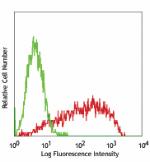
FD4/CHO (mouse DLL4 transfactant) cell line stained with pur... -
APC anti-mouse DLL4
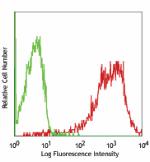
Mouse Dll4 transfected cells stained with HMD4-1 APC -
PE anti-mouse DLL4
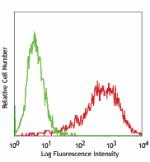
FD4/CHO cells stained with HMD4-1 PE

 Login / Register
Login / Register 









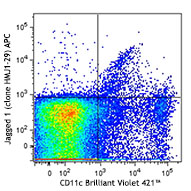
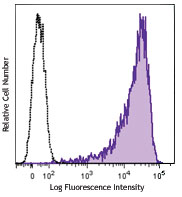



Follow Us